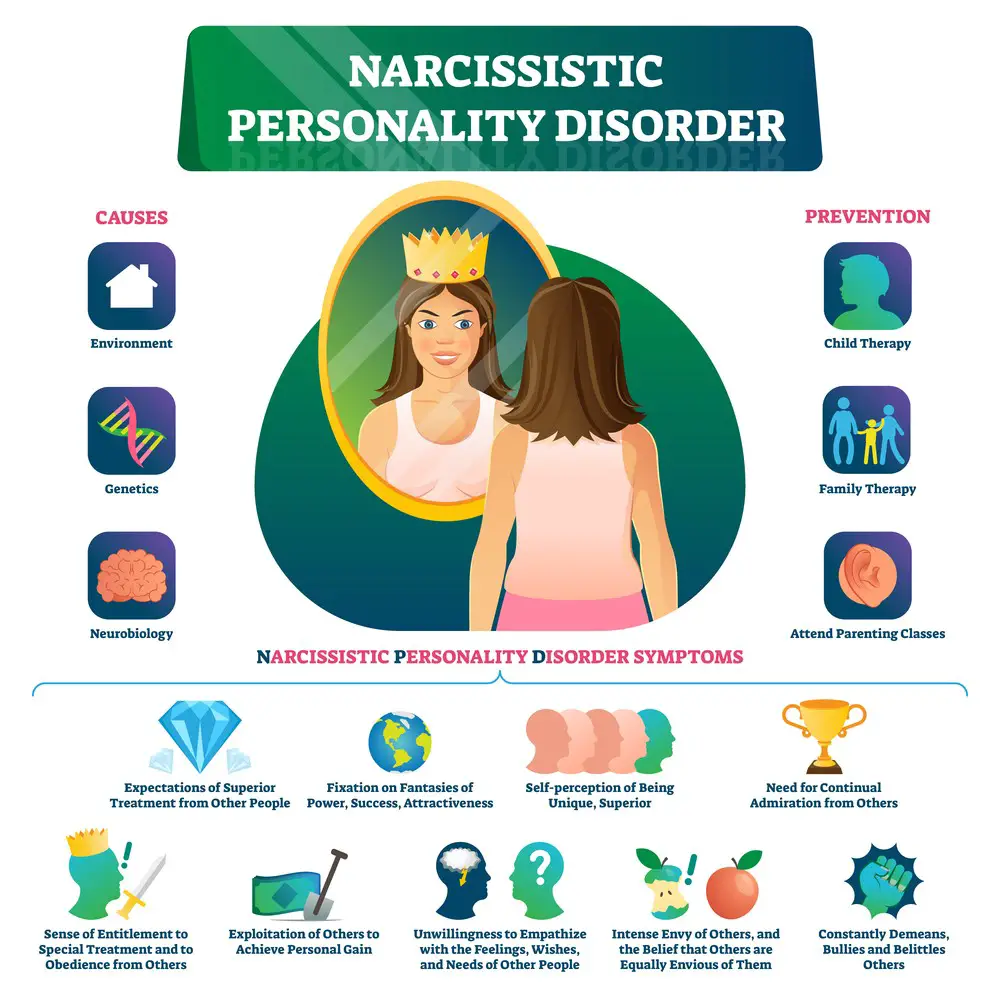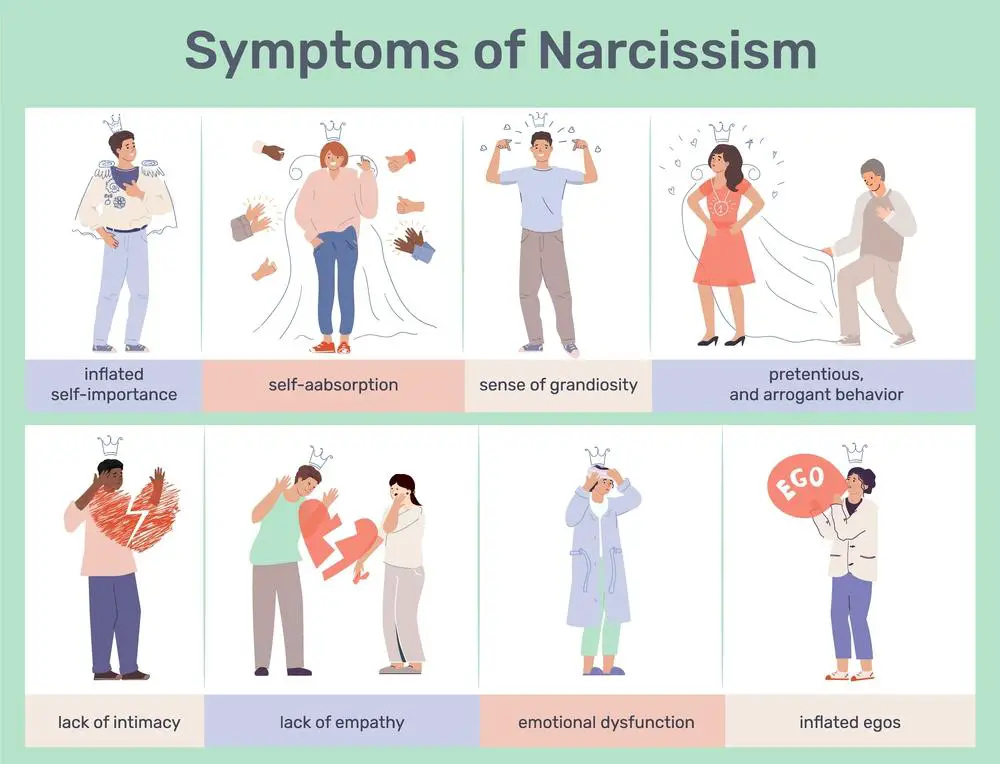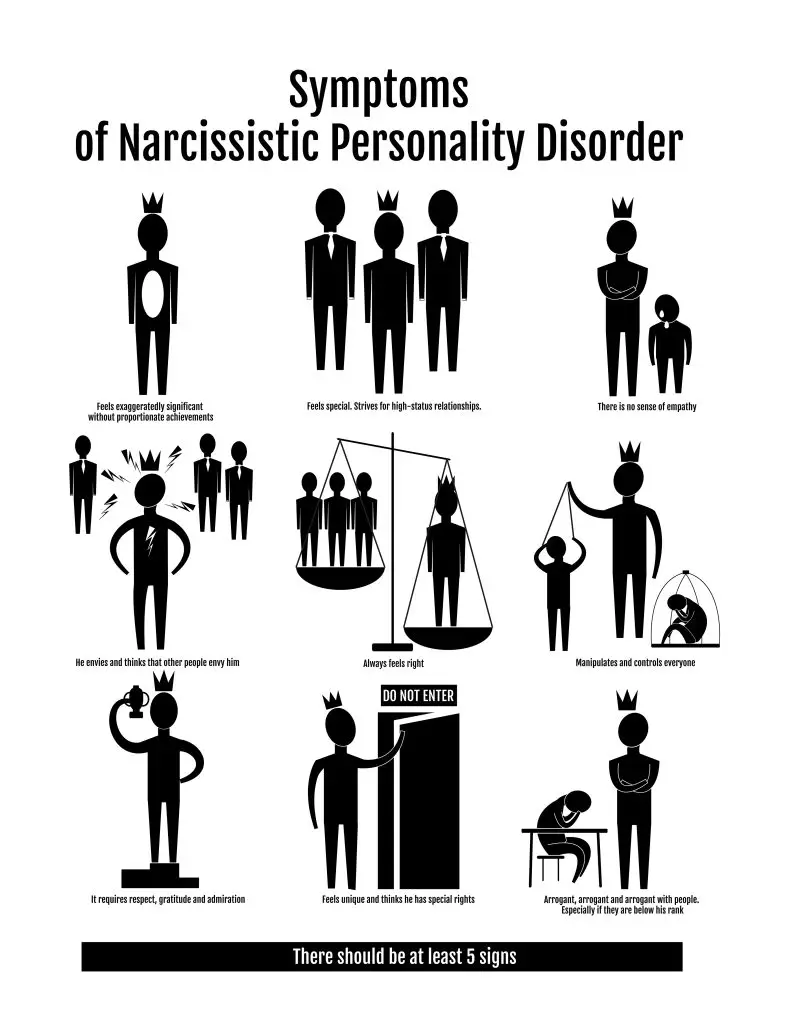As a BetterHelp affiliate, we receive compensation from BetterHelp if you purchase products or services through the links provided
Sociopathy and narcissism are two complex personality disorders that often lead to confusion due to their overlapping characteristics. While both might entail a lack of empathy and disregard for others, distinct differences are important to understand. Sociopathy, also known as antisocial personality disorder, involves a pattern of ignoring the rights of others. Narcissism, which is typically linked to narcissistic personality disorder, involves an inflated sense of self-importance and a deep need for excessive attention and admiration.
In considering historical perspectives, diagnostic criteria, and behavioral characteristics, one can observe that sociopaths tend to be more reckless, often violating laws or societal norms. At the same time, narcissists are predominantly preoccupied with fantasies of success, beauty, or ideal love. Emotional and affective differences also exist; sociopaths may have a limited range of emotions and lack remorse, whereas narcissists might get easily hurt by criticism and harbor secret feelings of insecurity. When it comes to interpersonal relations, sociopaths might struggle to form genuine connections due to their manipulative tendencies, and narcissists often take advantage of others to get what they want, lacking genuine empathy.
The impact on society by those with these disorders can be profound, shaping everything from individual relationships to more significant legal and ethical considerations. Treatment and management of these disorders are challenging but crucial for improving prognosis and outcomes. Understanding the nuances of each disorder enhances your ability to navigate interactions with those affected by them, be it in personal relationships or society at large.
Key Takeaways
- Sociopathy and narcissism are distinct personality disorders with specific behavioral patterns and emotional characteristics.
- Recognizing the differences between these disorders is vital for effective interpersonal relations and societal interaction.
- Effective management and understanding of these conditions are essential for mitigating their impact on individuals and communities.
 Defining Sociopathy and Narcissism
Defining Sociopathy and Narcissism
When you’re looking to understand sociopathy and narcissism, you’re delving into the realm of personality disorders characterized by distinct patterns of behavior and thought.
Sociopathy:
- Definition: Sometimes referred to as antisocial personality disorder, sociopathy is a mental condition where a person consistently shows no regard for right and wrong and ignores the feelings and rights of others.
- Characteristics:
- Disregard for society’s rules
- Incapacity for forming attachments to others
- Lack of guilt or remorse
People with sociopathy often manipulate or treat others harshly without expressing regret. These behaviors emerge by age 15 and are more about a pattern of interaction with society than isolated incidents.
Narcissism:
- Definition: Narcissistic personality disorder is characterized by an inflated sense of importance, a need for excessive admiration, and a lack of empathy for others.
- Features:
- A sense of entitlement or superiority
- Preoccupation with fantasies of success, power, or beauty
- Exploitative behavior in relationships
Your understanding of narcissism should include recognition of the fragile self-esteem that lies beneath the surface bravado. Typically, narcissistic traits become visible in early adulthood.
Key Takeaway: Being aware of the defining traits of sociopathy and narcissism can help you recognize these patterns in behavior. Sociopathy involves a disregard for societal norms and others’ rights, while narcissism centers around self-admiration and entitlement. Remember, only professionals can diagnose these disorders authentically.
Historical Perspectives
When you look into the concepts of sociopathy and narcissism, it’s important to understand that both have undergone significant shifts over time. Their evolution reflects changes in societal norms, values, and understanding of mental health.
 Evolution of Sociopathy Concept
Evolution of Sociopathy Concept
Early Views:
- 1800s: Initially, sociopathy wasn’t recognized as a distinct condition. Instead, behaviors now associated with sociopathy were often seen as forms of “moral insanity” or “moral derangement.”
- 1900s: The term “psychopathy” began to be used, closely resembling what you might recognize as sociopathy today.
Modern Understanding:
- DSM: By the time the Diagnostic and Statistical Manual of Mental Disorders (DSM) came into use, the term had evolved. Versions II (1968) and III (1980) of the DSM began to refer to “antisocial personality disorder,” which encompassed characteristics of what was once termed sociopathy.
Key Takeaway: Over time, your understanding of sociopathy shifted from a moral failing to a psychological disorder, broadening the view on associated behaviors and treatment.
 Evolution of Narcissism Concept
Evolution of Narcissism Concept
Classical Reference:
- Origin: The term “narcissism” originates in Greek mythology, specifically the story of Narcissus, who fell in love with his reflection.
Psychological Development:
- Early 20th Century: Sigmund Freud introduced narcissism in psychoanalytic theory, focusing on self-love and its impact on individual psychology.
- Late 20th Century: The DSM classified it as “narcissistic personality disorder” (NPD), identifying specific criteria for diagnosis.
Current Understanding:
- Today, narcissism is recognized as a spectrum, with traits varying from healthy self-esteem to dysfunctional personality disorder.
Key Takeaway: Your grasp of narcissism evolved from mythological tales to a nuanced psychological concept with a clear diagnostic framework.
Diagnostic Criteria
In assessing sociopathy and narcissism, mental health professionals rely on specific diagnostic criteria. These guidelines assist in differentiating between the two disorders, ensuring accurate understanding and support for those affected.
Criteria for Sociopathy
A sociopath is identified through a pattern of disregard for and violation of the rights of others. Key features include:
- Deceitfulness: Frequently lying or conning others for personal profit or pleasure.
- Impulsivity: Failure to plan or consider outcomes.
- Aggressiveness: Displaying irritability and aggressiveness, often resulting in physical fights or assaults.
- Reckless disregard: Showing indifference to the safety of oneself or others.
- Irresponsibility: Consistently being unreliable in work or financial obligations.
Key takeaway: Sociopathy is characterized by persistent patterns of antisocial behavior, disregard for societal norms, and lack of empathy for others.
 Criteria for Narcissism
Criteria for Narcissism
For narcissism, the criteria center on patterns of grandiosity, a need for admiration, and a lack of empathy. Notable traits include:
- Grandiose sense of self-importance: Believing oneself superior and unique, expecting recognition for achievements without commensurate achievements.
- Fantasies of unlimited success: Preoccupation with thoughts of brilliance, power, or perfect love.
- Sense of entitlement: Unreasonable expectations of especially favorable treatment or compliance with one’s wishes.
- Interpersonal exploitation: Taking advantage of others to achieve one’s ends.
- Lack of empathy: Being unwilling to recognize or identify with the feelings and needs of others.
Key takeaway: Narcissism involves a pervasive pattern of grandiosity, a constant need for admiration, and a profound lack of empathy, which influences numerous aspects of the individual’s life, notably in interpersonal relationships.
Behavioral Characteristics
In distinguishing sociopaths from narcissists, you’ll find their behaviors can be quite revealing. While there’s some overlap, certain telltale signs are characteristic of each condition.
Sociopath Behavioral Traits
- Impulsivity: You may notice that sociopaths act without considering consequences.
- Lack of empathy: They often have difficulty feeling empathy for others.
- Deceitfulness: Lying and manipulation are common for sociopaths to achieve their goals.
- Social norms disregard: Sociopaths tend to defy societal norms and laws.
Key Takeaway: Sociopaths often display impulsivity and a stark disregard for the rights and feelings of others, which is manifested in deceitful behaviors.
Narcissist Behavioral Traits
- Grandiosity: A narcissist will often have an inflated sense of self-importance.
- Need for admiration: They seek excessive admiration and attention.
- Lack of empathy: Similar to sociopaths, narcissists struggle to recognize others’ needs and feelings.
- Entitlement: They may act with a sense of entitlement and expect preferential treatment.
Key Takeaway: Narcissists exhibit behaviors centered around self-admiration and entitlement, often lacking empathy toward others.
Emotional and Affective Differences
Understanding the emotional and affective differences between sociopaths and narcissists can provide clarity in distinguishing the two. Each displays unique emotional patterns and responses that are pivotal to their interactions.
Sociopath Emotional Patterns
Sociopaths tend to exhibit a limited range of emotions, which often results in a flat affect or appear emotionless in situations where others would show feelings. Their emotional experiences are shallow, and they can fake emotions to manipulate or appear typical.
- Shallow Affect: Their emotional response is often superficial and fleeting.
- Manipulation: Emotions are mimicked to achieve a desired outcome without feeling them.
Key Takeaway: You should note that a sociopath’s emotions are typically underdeveloped, which impacts their ability to empathize with others’ feelings.
Narcissist Emotional Patterns
Narcissists, on the other hand, are typically very much in touch with their emotions but are excessively concerned with their own needs and feelings. They often display:
- Exaggerated Emotions: Their emotions can be intense, particularly concerning themselves or their desires.
- Lack of Empathy: Despite their emotional capacity, narcissists struggle to recognize or validate others’ emotions.
Key Takeaway: Your understanding of a narcissist should include their self-centered emotional world, where their feelings take precedence over others.
Interpersonal Relations
In examining sociopaths and narcissists, understanding how they function in relationships is crucial. It’ll give you a more precise preview of the potential challenges and dynamics.
Sociopaths in Relationships
When you’re dealing with a sociopath in a relationship, you can expect a lack of empathy and difficulty in forming genuine emotional bonds. They may engage in manipulative behavior to achieve their desires.
- Emotional Connection: Limited or absent empathy; may fake emotions to manipulate.
- Behavior: Highly manipulative and often deceitful.
Key Takeaway: Your interactions with a sociopath are likely to be unpredictable and potentially volatile due to their disregard for others’ feelings.
 Narcissists in Relationships
Narcissists in Relationships
Narcissists, on the other hand, crave admiration and attention. They often prioritize their needs over their partners’ and cannot genuinely empathize with their significant other’s feelings.
- Self-focus: Elevated self-importance, expect constant praise and attention.
- Empathy: Struggle to show genuine empathy; relationships are often superficial.
Key Takeaway: Relationships with a narcissist can be one-sided, with your needs frequently overshadowed by their thirst for admiration.
Impact on Society
In any community, the behaviors and characteristics of individuals with sociopathy or narcissism can ripple through social and professional settings, altering dynamics and affecting overall harmony.
Sociopaths’ Social Impact
- Sociopaths often struggle with empathy, making it challenging for them to form genuine connections. This may lead to a breakdown in trust within communities and organizations, as they can engage in deceptive or manipulative behavior.
- Key takeaway: Your awareness of a sociopath’s impact can help promote a more vigilant and supportive community structure.
Narcissists’ Social Impact
- Self-centered attitudes from narcissists can lead to conflicts or a lack of collaboration in group settings. Their need for admiration might cause them to undercut others’ achievements, disrupting team unity.
- Key takeaway: Understanding the influence of narcissists can guide you in creating more inclusive environments that value everyone’s contributions.
Treatment and Management
Effective treatment and management strategies are pivotal for individuals dealing with sociopathy and narcissism. Tailored approaches are necessary, as each condition has its intricacies.
Treating Sociopathy
Sociopathy, also termed Antisocial Personality Disorder (ASPD), is challenging to manage. Your treatment plan might include:
- Therapy Sessions: Cognitive-behavioral therapy (CBT) is often used to help you learn new patterns of thinking and behavior. Motivational interviewing can also aid in fostering a desire to change.
- Medication: While there’s no specific medication for ASPD, some drugs might be prescribed to tackle symptoms like aggression.
It’s key to remember that your commitment to treatment is crucial. Progress can be slow, but consistency is your ally here.
Treating Narcissism
Narcissistic Personality Disorder (NPD) treatments focus on helping you relate better to others so you can form healthier relationships. The pathway might include:
- Psychotherapy: This is the cornerstone of treatment for NPD. Therapists work with you using techniques from CBT or other therapy forms to address underlying issues.
- Group Therapy: Being part of a therapy group can help you understand others’ perspectives and develop empathy.
Steady and patient engagement with therapy can lead to improvements in your interactions.
Key Takeaway: Your dedication to the treatment process is vital, and while challenges are part of the journey, perseverance can bring about meaningful progress.
Prognosis and Outcomes
Understanding the long-term prospects for individuals with sociopathic or narcissistic traits can guide your expectations for relationships and interactions with them. Each condition has distinct implications for the future behavior and patterns you might observe.
Long-Term Outlook for Sociopaths
Individuals with sociopathic behavior often exhibit a pattern that remains consistent over the long term. They may:
- Struggle to form genuine emotional attachments.
- Exhibit ongoing disregard for social norms and laws.
- Frequently engage in behavior that might result in criminal consequences.
Key Takeaway: You should be mindful that significant changes in behavior are uncommon, and maintaining clear boundaries is crucial.
Long-Term Outlook for Narcissists
For narcissists, the prognosis can vary, depending on their awareness and willingness to seek help. They may:
- Continue to display an inflated sense of self-importance.
- Find it difficult to recognize the needs and feelings of others.
- Possibly improve with therapy that focuses on developing empathy and self-esteem in healthier ways.
Key Takeaway: While entrenched narcissistic traits may persist, there’s room for growth, particularly with professional guidance.
Legal and Ethical Considerations
When considering the behaviors of sociopaths and narcissists, particularly in legal contexts, you must be prudent. Laws don’t recognize sociopathy or narcissism directly; instead, they deal with actions. If someone commits a crime, the legal system holds them accountable, regardless of personality disorders.
- Recognition in Court: Sometimes, personality disorders like narcissism or sociopathy are acknowledged during legal proceedings, affecting judgments or sentences.
- Workplace Ethics: Ethically, if you’re an employer, it’s critical to understand that these traits alone don’t justify termination without cause.
Yet, the ethical dilemma lies in balancing protection against unfair discrimination with the need to guard against potentially harmful behaviors. For example:
- Responsibility: You can’t hold someone’s personality traits as inherently criminal, but you should remain vigilant.
- Professional Diagnosis: Only qualified professionals should diagnose these traits, as mislabeling can lead to legal and ethical complications.
Legal systems may take into account personality disorders in determining the motive or intent behind crimes, which can lead to varied outcomes. For instance:
- Mitigating Circumstances: Courts might consider these traits as mitigating circumstances if they impact an individual’s capacity to understand their actions.
- Divorce Proceedings: In family law, personality disorders can impact custody decisions when evaluating a child’s best interests.
In the end, tread carefully with these concepts in legal and ethical situations. Your awareness and sensitivity to the nuances of these personality traits can foster fairness and justice. Remember, while sociopathy and narcissism might explain behavior, they don’t excuse wrongdoing.
Unraveling the Mysteries: Psychopathy, Sociopathy, and Narcissism
Understanding the Differences
- Origins and Development: Psychopathy is often seen as the result of genetics and brain chemistry, while sociopathy is more closely linked to environmental factors, like upbringing and trauma. Narcissism, on the other hand, can stem from a complex mix of these factors.
- Behavioral Patterns: Psychopaths tend to be calculated and cold, often planning their actions. Sociopaths are more impulsive and volatile. Narcissists, while they may share traits of manipulation with psychopaths and sociopaths, are primarily characterized by an inflated sense of self-importance and a deep need for admiration.
- Ability to Form Relationships: Psychopaths struggle to form genuine emotional connections, making their relationships superficial. Sociopaths can form attachments, though these are often problematic. Narcissists form relationships based on how others can serve their needs, often lacking empathy for others.
- Response to Consequences: Psychopaths typically show no remorse or guilt; sociopaths might feel a limited amount of these emotions, primarily with people close to them. Narcissists, while they might not feel guilt in the traditional sense, are deeply affected by criticism or perceived failures.
Key Takeaways: Understanding these distinctions can deepen our knowledge and guide us in interactions with individuals displaying these traits. Remember, while these definitions provide a framework, human behavior is complex and varied.
Frequently Asked Questions
In navigating the complex terrain of personality disorders, it’s crucial to understand the differences and overlaps between sociopaths and narcissists. This section aims to clarify common queries, ensuring you can recognize distinct behaviors and handle interactions effectively.
What are the key differences between a sociopath and a narcissist?
A sociopath typically displays a lack of empathy and a propensity for manipulating others for personal gain without remorse. Narcissists, on the other hand, are characterized by an inflated sense of self-importance and a deep need for admiration. While sociopaths may engage in calculated deception, narcissists often believe they deserve special treatment.
- Key Takeaway: Sociopaths manipulate with little remorse; narcissists crave admiration and special treatment.
Can individuals exhibit traits of both narcissism and sociopathy?
Yes, someone can exhibit traits of both conditions, though they are distinct disorders. Such individuals may seek excessive admiration like narcissists while also manipulating others without guilt akin to sociopaths.
- Key Takeaway: Traits can overlap, leading to a complex behavioral pattern needing careful navigation.
What behaviors are indicative of narcissistic sociopath abuse?
Narcissistic sociopath abuse might include verbal berating, emotional manipulation, and gaslighting, making you question your sanity. The abuser typically lacks empathy, feels entitled, and may use charm to deceive and control.
- Key Takeaway: Be wary of emotional manipulation and gaslighting as signs of potential abuse.
How should one handle interactions with a person displaying narcissistic sociopathic behavior?
When dealing with such individuals, setting clear boundaries and protecting your emotional well-being is wise. Avoid engaging in confrontations and seek support from trusted friends or professionals.
- Key Takeaway: Set boundaries and seek support to protect your mental health.
What are the defining characteristics of antisocial personality disorder as they relate to narcissism?
Antisocial personality disorder features a pervasive pattern of disregard for the rights of others. When related to narcissism, this might include exploiting others without guilt and prioritizing one’s own needs over everything else.
- Key Takeaway: The intersection can lead to a profound lack of regard for others’ rights and self-centeredness.
What strategies are recommended for dealing with someone who is narcissistically abusive in a relationship?
Stay informed about narcissistic abuse tactics. Establish personal limits and consistently maintain them. Prioritize self-care and consider seeking therapy to navigate the complexities of the relationship. If necessary, create an exit plan for leaving the relationship safely.
- Key Takeaway: Stay vigilant, maintain boundaries, prioritize self-care, and seek professional guidance.
Navigating the Storm: Overcoming the Challenges of Narcissistic Relationships and Custody Battles ????️????️
In this deeply personal and enlightening section, I share my journey through the tumultuous seas of dealing with a narcissistic ex-partner, the complexities of custody disputes, and my continuous battle with mental health.
My Story: A Walk Through Fire and Ice ❄️????
- The Narcissist’s Playbook: My ex, a textbook narcissist, used her charm to entangle community leaders in affairs, only to later smear their reputations. This pattern of behavior escalated as she aged, her beauty fading but her narcissism intensifying.
- The Battle for My Children: Despite years of a cordial post-divorce relationship, she abruptly severed my connection with our children, blatantly defying court orders and custody agreements.
- My Mental Health Journey: To cope, I’ve turned to Lexapro and regular therapy sessions, recently joining BetterHelp. Long walks have become my sanctuary, a space to clear my thoughts amidst this chaos.
- From Pain to Purpose: Writing about mental health and narcissism isn’t just a passion; it’s a mission to support others in similar struggles. My legal site extends this help, guiding those entangled in non-compliant spousal behaviors and complex custody issues.
A Personal Reflection: Losing close contact with my children has been a mental health crucible. Yet, I remain steadfast in my belief: With the right support and determination, anyone can overcome their mental health challenges.
Jacob Maslow Passionate Mental Health Advocate, Veteran Therapy Enthusiast, Legal Advisor, and Devoted Father
- 7 Ideas to Help You Relax and Unwind on a Family Vacation - April 27, 2025
- How Having Cybersecurity Protection Helps You Relax - April 25, 2025
- 8 Reasons Why Spending Time Outside Calms You Down - April 25, 2025
This site contains affiliate links to products. We will receive a commission for purchases made through these links.


 Defining Sociopathy and Narcissism
Defining Sociopathy and Narcissism Evolution of Sociopathy Concept
Evolution of Sociopathy Concept Evolution of Narcissism Concept
Evolution of Narcissism Concept Criteria for Narcissism
Criteria for Narcissism Narcissists in Relationships
Narcissists in Relationships
